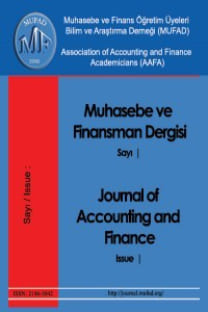Influence Of Budget Deficit On Economic Growth: The Case Of The Republic Of Macedonia
Economic growth, budget deficit, cause relation, Republic of Macedonia
___
- Adama, C. - Bevan D. (2005), “Fiscal deficits and growth in developing countries”, Journal of Public Economics, Vol. 89, pp. 570-598.
- Acosta, S. - Morozumi A. (2013), “Can a government Enhance Long-Run Growth by Changing the Composition of Public Expenditure?” IMF Working Paper 13/162, Washington DC., International Monetary Fund, pp.8-10.
- Agenor, P. (2010), “A Theory of Infrastructure- led Development”, Journal of Economic Dynamics and Control, pp. 930-945.
- Ahmad, H. - Millar M. (2000), “Crowding-out and Crow dinging Effects of the Components of Government Expenditure”, Contemporary Economic Policy, pp. 123-135.
- Aisen, A. - Hauner D. (2008), “Budget Deficit and Interest Rates”, IMF Working Papers, 42, pp. 5-20.
- Afonso, A. - Rault. C. (2007), “Should we Care for Structural Breaks When Assessing Fiscal Sustainability?” Technical University of Lisbon, pp. 22.
- Arestis, P. - Sawyer M. (2006), “The Intertemporal Budget Constraint and the Sustainability of Budget Deficits”, University of Leeds, pp.55.
- Bergh, A. - Henkkerson M. (2011), “Government Size and Growth: A Survey and Interpretation of the Evidence”, Journal of Economic Surveys, pp. 870-880.
- Cebula, R. (2003), “Budget Deficit and Real Interest Rates: Updated Empirical Evidence on Causality”, Atlantic Economic Journal, 31, pp. 250-260.
- Carneiro, F. - Joao F. (2005), “Government Revenues and Expenditures in Guinea- Bissau”, Journal of Economic Development, Texas, World Bank, pp. 17.
- Durevall, D. - Henrekson M. (2011), “The Futile Quest for a Grand Explanation of Long-run Government Expenditure”, Journal of Public Economics, pp. 710-720.
- Eisner, R. (1989), “Budget deficits: Rhetoric and Reality”, Journal of Economics Perspectives, Vol. 3, pp.73- 78.
- Fisher, S. (1993), “The role of macroeconomic factors in growth”, Journal of Monetary Economics, Vol. 32, pp. 484.
- Gupta, S. - Baldacci E. (2005), “Fiscal policy, expenditure composition and growth in low- income countries”, Journal of International Money and Finance, Vol, 24, pp. 440-460.
- Gebhard, K. - Silika P. (2006), “Sustainability of Swiss Fiscal Policy”, CESIFO Working Paper 1689, Switzerland, University of St. Gallen, pp. 30-50.
- Gemmell, N. - Au J. (2012), “Government Size, Fiscal Policy and the Level and Growth of Output: A Review of Recent Evidence”, Working Paper in Public Finance 10/12, Victoria Business School, Wellington, pp. 20.
- Huynh, D. (2007), “Budget Deficit and Economic Growth in Developing Countries: The case of Vietnam”, Kansai Institute for Social and Economic Research, pp. 33.
- Homes, J.M. - Otero J. (2007), “Are EU Budget Deficits Sustainable?” New Zealand, Waikato University, pp.18-35.
- Keynes, J.M. (1936), “The General Theory of Employment, Interest and Money, Macmillan Cambridge University Press”, Royal Economic Society, pp.10-20.
- Kneller, R. – Gemmell, N. – Bleaney, M. (1999), “Fiscal policy and growth: evidence from OECD countries”, Journal of Public Economics, pp. 170.
- Kneller, R. – Misch, F. (2011), “What Does Ex- post Evidence Tell Us about the Output Effects of Future Tax Reforms?” Centre of European Economic Research, Mannheim, pp.10.
- Kukk, K. (2008), “Fiscal policy effects on economic growth: Short- run vs long run”, TTUWPE No. 167, Department of Economics Tallinn University of Technology, Estonia, pp.15-20.
- Keho, Y. (2010), “Budget Deficits and Economic Growth: Causality Evidence and Policy Implications for WAEMU Countries”, European Jоurnal of Economics, Finance and Administrative Sciences, 18, pp. 100-105.
- Lozano, I. (2008), “Budget Deficit, Money Growth and Inflation: Evidence from the Columbian case”, Barradores de Economia, pp. 5-20.
- Musgrave, R. A. (1989), “Public Finance in Theory and Practice”, 5th international edition. pp.22.
- Niepelt, D. (2007), “Starving the beast? Intra- generational conflict and balanced budget rules”, European Economic Review, Vol.51, pp. 145.
- Saleh, S.A. (2003), “The Budget Deficit and Economic Performance”, University Wollongong Economics Working Paper Series, 12, pp. 20-40.
- Sill, K. (2005), “Do Budget Deficits Cause Inflation?” Business Review, pp.20-30.
- Vit, K. (2004), “The Possibilities of Budget Deficit Financing”, Ministry of Finance of the Czech Republic, pp. 1-15.
- Zulal, S. (2007), “Endogenous Growth, Taxes and Government Spending: Theory and Evidence”, Review of Development Economics, pp.120-130.
- ISSN: 2146-3042
- Yayın Aralığı: Yılda 4 Sayı
- Başlangıç: 2005
- Yayıncı: Muhasebe ve Finansman Öğretim Üyeleri Derneği (MUFAD)
İşletmelerin Sürekliliğini Tehlikeye Düşürecek Riskler ve Kontrol Önerileri: KOBİ’lerde Bir Uygulama
Beklentiler Ve Güven Endekslerinin Finansal Piyasalar Üzerine Etkisi
Semra T. ALTUNTAŞ, Vedat SARİKOVANLİK, Nertil MERA
Belediyelerin Mali Tabloları İle Nüfus Arasındaki İlişkinin Analizi 1980 – 2014 Arası Analiz
Gülistan BAŞCI, Eşref Savaş BAŞCI
Possibilities For Managing Financial Crises Of Macedonian Companies
Biljana ANGELOVA, Neda PETROSKA-ANGELOVSKA, Marija ACKOVSKA
European Central Bank -Conventional And/Or Unconventional Instruments For Monetary Policy
Klimentina POPOSKA, Elena MIHAJLOSKA, İskra STANCHEVA-GİGOV
Semra Aksoylu, Derviş Boztosun, Fatih Altınışık, Emre Hayri Baraz
Mihriban COŞKUN ASLAN, Serkan DEMİRKAN
Balkanlarda Transfer Fiyatlaması
Batuhan GÜVEMLİ, Halil İbrahim ALPASLAN, Mehmet Emre ŞUŞOĞLU
Bulut Muhasebe Sistemleri ve Bir SWOT Analizi
